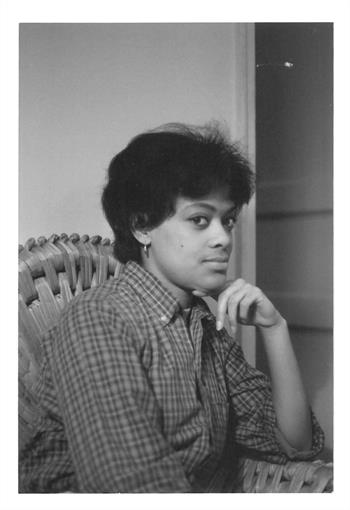
Toni Cade Bambara was an iconic writer, teacher, activist, filmmaker, and cultural worker who centered the experiences of black communities in her work. Born Miltona Cade in 1939, Bambara grew up in Harlem, New York. She received her B.A. in theater arts and English at Queens College in 1959. That same year she published “Sweet Town,” her first short story. In 1964, Bambara received an M.A. from City College of New York. She would go on to teach at a number of universities and colleges, including Atlanta University, Spelman College, Livingston College, Emory University, and Rutgers University.
In 1970, Bambara published the iconic anthology The Black Woman, which featured essays, poems, shorts stories by numerous black women artists such as Audre Lorde, Alice Walker, and Abbey Lincoln. Additionally, she edited Tales and Stories for Black Folks in 1971. Her numerous publications include Gorilla My Love (1972), Sea Birds Still Alive (1977), The Salt Eaters (1980), and Those Bones Are Not My Child (published posthumously in 1999 after her death in 1995). Her films include The Bombing of Osage Avenue (1985) and W.E.B. DuBois: A Biography in Four Voices (1995).
Spelman College Archives
Mailing Address: 350 Spelman Lane, S.W., Box. 321, Atlanta, GA. 30314
Campus Location: The Camille Olivia Hanks Cosby, Ed.D. Academic Center, Room 200 (2nd Floor)
404-270-5533
TheArchives@spelman.edu
Archive Hours: Mon. - Fri. | 9 a.m. - 5 p.m. | Researcher Hours: Tues. – Fri., 10 a.m. – 4 p.m.
The Spelman Archives are proud to be the repository for Toni Cade Bambara’s papers. Donated by Toni’s daughter Karma Bambara Smith, the collection contains personal correspondence, business records, drafts, essays, research notes, audio video materials, and photographs. Topics highlighted include Bambara’s friendships with other writers and activists, her family, travels to Vietnam, her work in many cultural arts organizations and her research process for her writing and film projects.
For over 15 years Spelman’s Women’s Research and Resource Center has facilitated a conference in honor of Toni Cade Bambara during March, her birthday month. The Archives are proud to partner with the Women’s Center to highlight her life and research by and about black women. For more information about the conference and the Toni Cade Bambara Scholar-Writer-Activist Program, see the Women’s Center website.
*Biographical Information adapted from The Black Past, The Georgia Writers Hall of Fame and The Library of Congress.
